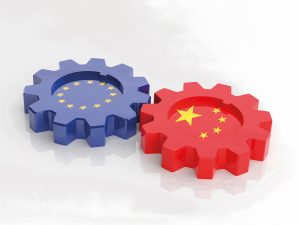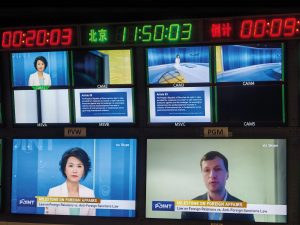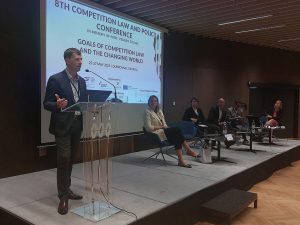With rising geopolitical tensions, global economic integration poses a multitude of risks. Countries are increasingly dependent on each other for the supply of important goods, services, and technologies. Supply chain disruptions during the coronavirus pandemic have brought to light these vulnerabilities that are now increasingly exploited to attain various political, economic, and even military objectives. For the European Union (EU), the concept of ‘strategic autonomy’ embedded in the EU’s New Strategic Agenda 2019-2024 signifies its capacity to act independently in strategically important policy areas ranging from defence to healthcare.
Promoting Domestic Production and Reducing Dependencies
Under its ‘strategic autonomy’ agenda, the EU aims to promote its economic competitiveness, protect itself from economic security risks, and partner with a wider range of countries for mutually beneficial economic relations. In pursuit of these objectives, it has adopted a number of industrial policies stimulating domestic production capabilities and reducing external supply dependencies. For example, the EU Chips Act aims to bolster the EU’s production capacity in semiconductors, targeting up to 20 per cent of the global market share by 2030. In addition, the proposed EU Critical Raw Materials Act promotes the diversification of supplies of critical raw materials and aims to improve sustainability and circularity through waste collection and recycling. The proposed EU Net-Zero Industry Act would support the EU’s Green Deal Industrial Plan by encouraging investments in ‘green technologies’ and promoting their manufacturing in the EU.
Economic Security and Foreign Investment Scrutiny
The EU is not alone in intertwining economic and security interests. Countries all over the world are continuously ‘securitising’ their economic relations to ensure resilience and reduce critical dependencies. At the same time, the EU attempts to balance its de-risking policies and its commitment to maintaining its open economy grounded on the four freedoms of the EU internal market: free movement of goods, free movement of people, freedom of capital, and freedom of establishment. Among the four freedoms, the freedom of capital is guaranteed not only to European citizens and businesses but also to investors from third countries. However, the pursuit of strategic autonomy and the implementation of de-risking policies will inevitably affect the exercise of the freedom of capital by foreign investors, particularly Chinese firms operating in Europe.
As the domains of security and public order fall under the exclusive competence of its member states, the EU coordinates the scrutiny of foreign investment using its common commercial policy powers related to external economic relations with other countries. For example, the European Commission carries out control over corporate mergers and acquisitions of a certain size that could potentially affect competition in the EU internal market. If such competition concerns exist, the Commission may require companies to modify their planned transaction or even prohibit it. While the EU merger control is ownership-neutral, not distinguishing between private and state-owned companies, acquisitions by large Chinese state-owned enterprises (SOEs) have raised several challenges in the merger assessment process. For instance, the Commission encountered difficulties in ascertaining whether and how state ownership and control affect the commercial decisions by the SOEs and whether they are likely to coordinate their market conduct.
Given the relatively modest presence of Chinese companies on European markets, no merger or acquisition involving Chinese firms has been prohibited under EU merger control thus far. The only notable case was the acquisition of the Swiss company Syngenta by ChemChina in 2017, where the Commission requested certain commitments to preserve competition in the pesticides and plant growth regulators market. Meanwhile, various stakeholder groups representing European industries have called for more stringent merger control that would consider industrial policies, subsidies, and the need to protect the competitiveness of European firms in global markets. These discussions accelerated in 2019, after the Commission prohibited the Siemens/Alstom merger, which was expected to create a ‘European champion’ in high-speed train manufacturing.
FDI Screening and Foreign Subsidies Regulation
Unwilling to ‘politicise’ the EU merger control, the Commission proposed an alternative regulatory framework—the EU Foreign Direct Investment (FDI) Screening Regulation—to protect the strategic interests of the EU and its member states. It established a coordination mechanism for the member states and the Commission to evaluate planned FDI projects for potential security risks. The following factors are considered during such screening: 1) critical infrastructure; 2) critical technologies; 3) supply of critical inputs such as energy, raw materials, and food; 4) access to sensitive information including personal data; and 5) freedom and pluralism of media. Following the adoption of the EU FDI Screening Regulation, member states have accelerated the adoption and expansion of their national screening mechanisms, which creates additional regulatory burdens for foreign investors and reduces predictability concerning the screening outcomes. The application of FDI screening in the EU is of particular concern for Chinese investors who may face more stringent scrutiny in the current geopolitical climate.
Furthermore, to ‘level the playing field’ in terms of subsidies that companies active on the EU internal market may receive from governments, the EU adopted the Foreign Subsidies Regulation, which entered into force in early 2023. As a result, any company active on the EU markets must disclose subsidies received from non-EU countries when it engages in mergers and acquisitions or participates in public procurement. The Commission would then determine whether such foreign subsidies could have distorting effects on the EU internal market.
Chinese Investments Likely to Face Challenges
The EU Competition Commissioner Margrethe Vestager noted in her speech at New York University in 2015: ‘Deng Xiaoping was famous for his saying that it doesn’t matter whether a cat is black or white as long as it catches mice. The antitrust enforcer version of this saying should be that: it doesn’t matter where the company comes from, as long as it competes—by the rules.’ Although the regulatory frameworks mentioned above are not discriminatory de jure, it is not hard to see that they may present substantial challenges to Chinese investments in Europe.
Author:
Alexandr Svetlicinii is an associate professor of Global Legal Studies in the Faculty of Law at the University of Macau (UM), where he also serves as programme coordinator of the Master of Law in International Business Law programme. His research on the regulatory treatment of Chinese investments in the European Union was supported by grants awarded by UM (Multi-Year Research Grant), the Institute of European Studies of Macau (Asia Europe Comparative Studies Research Grant) and the Macao Higher Education Fund.
Text & Photo / Alexandr Svetlicinii
Chinese Translation / Davis Ip
Source: UMagazine ISSUE 28



